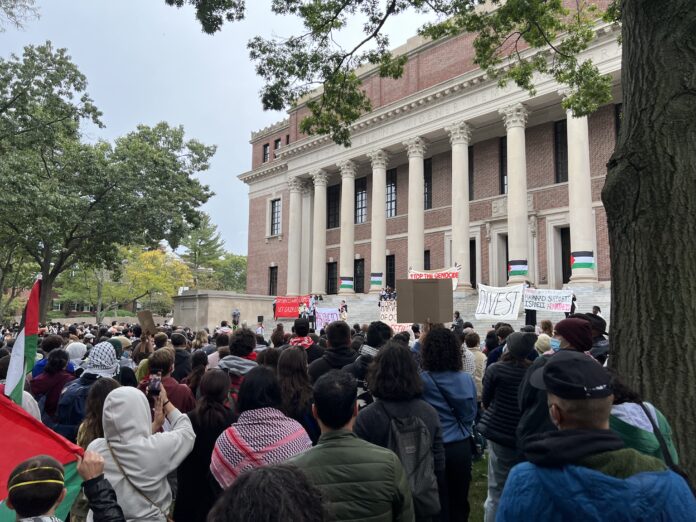11/29/2023 Correction: a previous version of this article described the intervening student as wearing a yarmulke, that was incorrect and the article has been updated to reflect this.
12/29/2023 Correction: a previous version of this article described the “die-in” as occurring in Harvard Yard, when it in fact occurred at Harvard Business School’s campus. The article has now been updated to properly reflect this.
On Nov. 8, 94 alumni of Harvard Law School issued a statement in The Times of Israel demanding that the administration “take action against violations of Title VI of the Civil Rights Act of 1964” on campus. The alumni allege that a Harvard Law student, identified in the statement as Ibrahim Bharmal (HLS ’24), engaged in “a verbal and physical assault” against a Jewish student at the Oct. 18 “die-in” protest held at Harvard Business School, wherein students lay on the ground to protest the ongoing conflict in Gaza.
The video that started the controversy appears to originate from an Oct. 31 X (the website formerly known as Twitter) post by Israeli LGBT activist Yuval David, which shows several pro-Palestine protesters wearing Palestinian keffiyehs—headscarves that have become a symbol of the movement—surrounding and accosting a student (identified as Jewish by David). The signatories allege this video shows “Mr. Bharmal expressly impeded a Jewish student’s freedom of movement […] and prevented him from walking on campus and accessing his dorm room.”
The interaction has been reported in a number of major news outlets as targeted harassment of a Jewish student, but protesters from the event but protesters and footage of the incident tell a different story.. Drone footage of the die-in posted by NBC on Oct. 18 shows a student walking among protesters lying on the ground, recording the protestors with their phone. Then a group of protesters in Palestinian keffiyehs and safety vests (identified by other attendees as safety marshals) guided the student away while obfuscating the view of the student’s phone, keeping their distance as he left the area.
“the protest marshals used the same nonviolent tactics they used in every protest” to de-escalate the situation.
Some protesters reported feeling threatened by the recording student and appreciated work by Bharmal and other safety marshals preventing the student from “taking invasive photos and getting in our faces.” L, one of the safety marshals at the Oct. 18 protest, characterized the event as “peaceful” and noted that the recording student had stepped on people lying down while recording.
“Ibrahim politely asked him to leave, after he refused the marshal team used keffiyuhs [sic] to block the camera and usher the man to the street, away from the protesters,” said L.
Another attendee noted that the recording student “had his phone out, screaming something, and began stepping over students” and that “the protest marshals used the same nonviolent tactics they used in every protest” to de-escalate the situation.
The alumni statement comes in the midst of an ongoing controversy regarding the doxxing and harassment of pro-Palestine students and students of color on campus. In October, Harvard Palestine Solidarity Committee published a letter regarding the Oct. 7 attacks on Israel signed by a number of student groups which drew strong and swift criticism. In response, multiple organizations published lists of names and sensitive information of Harvard students affiliated with the groups that signed on— including graduates and current students who did not know their organizations had signed the letter.
In addition to online lists, a truck with the names, faces and personal information of Arab, Muslim and nonwhite students has been circling the Harvard campus; the truck is rented by Accuracy in Media, a conservative nonprofit with a history of propagating conspiracy theories.
Various Harvard student organizations, including Harvard Hillel and the Harvard Jewish Law Students Association, have condemned acts of doxxing or intimidation targeted at specific students. There is concern that Bharmal, already a victim of the recent doxxing campaigns targeting Harvard students, could be exposed to even more harassment due to the Times of Israel statement.
Harvard President Claudine Gay (Ph.D. ’98) issued an email statement on Nov. 9 reaffirming Harvard University’s commitment to combating antisemitism, noting its cooperation with police and the FBI regarding the events of Oct. 18 and its creation of an “Antisemitism Advisory Group” composed of members Harvard’s Jewish community, as well as the existence of an anonymous reporting hotline for bias incidents (877-694-2275). Gay also pledged to implement “a robust program of education and training for students, faculty, and staff on antisemitism broadly and at Harvard specifically.”
As of Nov. 10, 2023 at 2PM, Harvard Law School Dean John Manning (A.B. ’82, J.D. ’85) has not yet commented publicly on the matter. The school has faced immense pressure as of late to address antisemitism on campus, most recently in the form of a Nov. 1 warning from several top law firms to crack down on antisemitism and criticism to avoid adverse effects on graduate job prospects.


